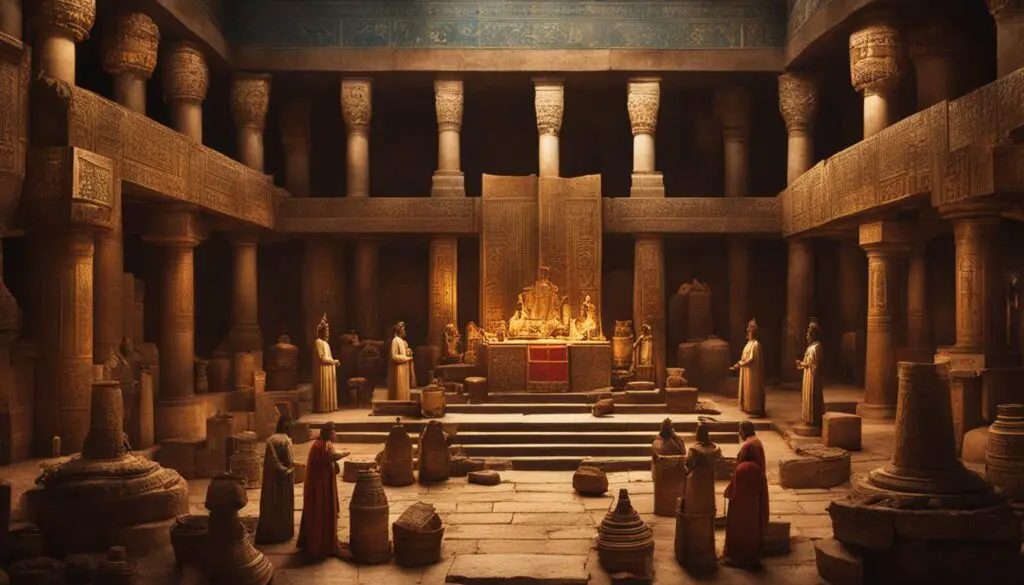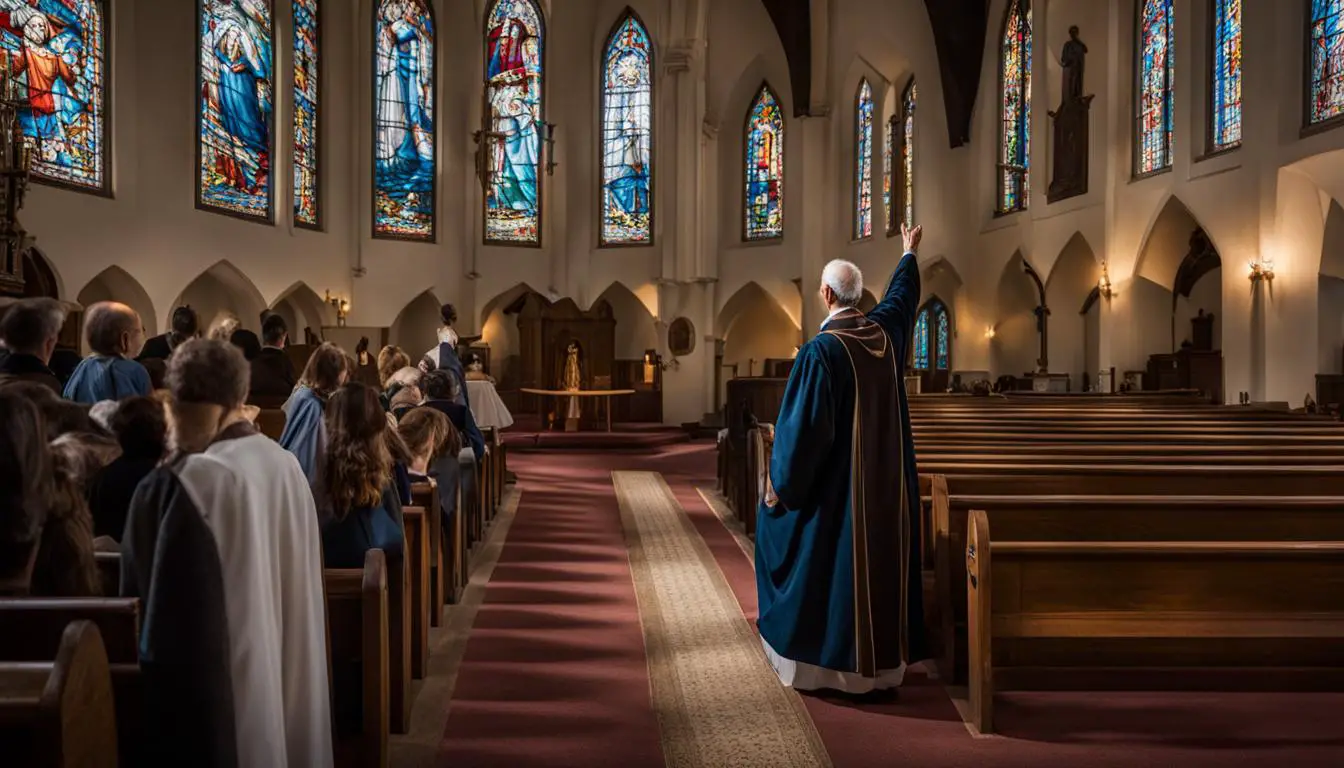The word “ordinance” in the Bible has two meanings. It can refer to the laws and commandments of God, or it can refer to the rites and ceremonies by which we formalize sacred covenants with God. Understanding the definition of ordinance is crucial for grasping the teachings and concepts of the Bible.
The etymology of the word “ordinance” in the Bible provides further insight into its meaning. In Hebrew scripture, it is derived from the term “chuqqah,” which relates to matters of ritual. In Greek scripture, it takes on various forms such as “dogma,” “dikaioma,” and “paradosis,” all representing religious and ceremonial regulations.
Exploring Bible verses from Hebrew scripture, such as Exodus 12:43 and Numbers 9:14, as well as Greek scripture verses like Luke 1:6 and 1 Corinthians 11:2, sheds light on the importance of ordinances in the biblical context.
Scholars emphasize the symbolic nature of ordinances and suggest studying scripture and the teachings of modern prophets to gain deeper insights. Bible stories further illustrate the role of ordinances in the lives of individuals, while the Bible itself provides guidance on the proper observance of these sacred rituals.
Understanding the biblical definition of ordinance is essential for believers navigating their spiritual journey. By comprehending the significance and symbolism behind ordinances, individuals can deepen their understanding of God’s laws and covenants outlined in the scriptures.
Key Takeaways:
- The word “ordinance” in the Bible has both legal and ceremonial meanings.
- Etymology reveals the origins of the word in Hebrew and Greek scriptures.
- Bible verses demonstrate the importance of ordinances in religious practices.
- Scholars offer valuable insights into the symbolic nature of ordinances.
- Bible stories provide practical examples of the role of ordinances in believers’ lives.
The Etymology of Ordinance in the Bible
The word ordinance in the Bible holds a significant place in understanding its teachings and concepts. To delve deeper into the meaning of ordinance, it is crucial to explore its etymology. The term “ordinance” is derived from the Hebrew word “chuqqah” and the Greek word “dogma.”
In the Old Testament, the Hebrew term “chuqqah” generally represents something prescribed or enacted with reference to matters of ritual. It encompasses the laws, customs, and regulations that govern religious and ceremonial practices. On the other hand, in the New Testament, the Greek term “dogma” refers to a decree or edict, emphasizing the authoritative nature of ordinances.
Understanding the etymology of “ordinance” helps us uncover its deeper meaning in biblical teachings. It sheds light on the roots of these sacred rituals and highlights their significance in the lives of believers.
Biblical Definition of Ordinance: Understanding the Roots of Sacred Rituals
| Term | Etymology | Meaning |
|---|---|---|
| Chuqqah (Hebrew) | Derived from Hebrew root “chaqa” | Prescribed or enacted ritual matter |
| Dogma (Greek) | Derived from Greek word “dogmatizo” | Decree or edict |
“Understanding the etymology of ‘ordinance’ helps us uncover its deeper meaning in biblical teachings.”
Ordinance in Hebrew Scripture
In the context of Hebrew scripture, the term “ordinance” is often referred to as chuqqah or choq. These ordinances hold deep religious and ceremonial significance and are closely associated with various rituals and practices. They are considered to be permanent institutions that reflect God’s will and guidance for His people.
Biblical verses such as Exodus 12:43 and Numbers 9:14 shed light on the importance of these ordinances in Hebrew scripture. For example, Exodus 12:43 states, “The Lord said to Moses and Aaron, ‘This is the ordinance of the Passover: no foreigner shall eat it.’” This verse highlights the specific instructions and regulations surrounding the observance of the Passover feast, which is an essential ordinance in the Hebrew faith.
Understanding the ordinances in Hebrew scripture allows us to delve deeper into the rich traditions and practices that form the foundation of the biblical teachings. It provides insights into the cultural and religious landscape of the ancient Israelites and helps us appreciate the significance of these ordinances in their lives.
The Importance of Ordinances in Hebrew Scripture
The ordinances outlined in Hebrew scripture serve as a means of establishing a sacred connection between God and His people. They provide a framework for worship, obedience, and the preservation of God’s teachings. These ordinances are not merely ceremonial rituals but are meant to guide individuals in their spiritual growth and relationship with God.
Through the observance of these ordinances, the Israelites demonstrated their commitment to following God’s commandments and living according to His will. The ordinances reinforced their faith, reminded them of God’s covenant with them, and provided a way for them to express their devotion.
Additionally, the ordinances in Hebrew scripture served as a means of identifying the Israelites as a distinct and chosen people. It was through the observance of these ordinances that they demonstrated their faithfulness and set themselves apart from other nations. It was a way for them to honor and worship God as the one true God.
| Ordinance | Scripture Reference |
|---|---|
| Passover | Exodus 12:43 |
| Circumcision | Genesis 17:10-14 |
| Sabbath | Exodus 31:16-17 |
| Tabernacle construction | Exodus 25-40 |
These biblical ordinances continue to hold significance for believers today, offering us a glimpse into the faithful practices of our ancestors in the faith. By studying and understanding these ordinances, we can gain a deeper appreciation for the foundations of our own spiritual traditions.
Ordinance in Greek Scripture
In Greek scripture, the concept of ordinance is expressed through various words such as dikaioma, dogma, paradosis, and ktisis. Each of these words carries distinct meanings and often relates to ceremonial and religious regulations. Let’s explore some Bible verses that demonstrate the usage of these Greek terms in relation to ordinances.
1. Luke 1:6 – “And they were both righteous before God, walking in all the commandments and ordinances of the Lord blameless.”
This verse emphasizes the importance of following the commandments and ordinances of the Lord. It portrays the observance of ordinances as an integral part of righteous living. By adhering to these ordinances, individuals demonstrate their obedience to God’s will.
2. Hebrews 9:1 – “Then verily the first covenant had also ordinances of divine service, and a worldly sanctuary.”
This verse highlights the presence of ordinances within the context of worship and the Old Testament covenant. It signifies that ordinances played a significant role in the divine service and the establishment of a sacred space for worship.
3. Ephesians 2:15 – “Having abolished in his flesh the enmity, even the law of commandments contained in ordinances; for to make in himself of twain one new man, so making peace.”
This verse suggests that Jesus Christ’s sacrifice abolished the enmity between God and man, including the law of commandments contained in ordinances. It indicates a transformation and reconciliation through Christ, leading to a new way of living and peace.
4. Colossians 2:14 – “Blotting out the handwriting of ordinances that was against us, which was contrary to us, and took it out of the way, nailing it to his cross.”
In this verse, the handwriting of ordinances is portrayed as something that was against humanity and contrary to their well-being. Through his crucifixion, Christ removed the burden of these ordinances, demonstrating his role as the ultimate sacrifice for the redemption of mankind.
5. 1 Corinthians 11:2 – “Now I praise you, brethren, that ye remember me in all things and keep the ordinances, as I delivered them to you.”
Paul commends the Corinthians for remembering and keeping the ordinances that he delivered to them. This verse underscores the importance of faithfully observing the ordinances and following the teachings handed down by the apostles.
| Verse | Ordinance | Description |
|---|---|---|
| Luke 1:6 | Walking in all the commandments and ordinances of the Lord blameless | Emphasizes the importance of adhering to the commandments and ordinances in leading a righteous life. |
| Hebrews 9:1 | Ordinances of divine service and a worldly sanctuary | Illustrates the role of ordinances within the context of worship and the establishment of a sacred space. |
| Ephesians 2:15 | Abolished the law of commandments contained in ordinances | Portrays Christ’s sacrifice as bringing an end to the enmity and providing a new way of living in peace. |
| Colossians 2:14 | Blotting out the handwriting of ordinances | Highlights Christ’s role in removing the burden of ordinances through his crucifixion. |
| 1 Corinthians 11:2 | Keeping the ordinances as delivered by Paul | Emphasizes the importance of faithfully observing the ordinances and following the teachings of the apostles. |
The Importance of Biblical Ordinances
Understanding the significance of biblical ordinances is essential for every believer. Ordinances are not mere rituals; they hold profound spiritual meaning and play a vital role in our relationship with God. These sacred ceremonies are designed to teach, test, and bless us on our journey towards salvation.
In the Bible, ordinances are seen as divine commandments that should not be altered or changed. They are given by God to guide His people and ensure their spiritual growth. By participating in ordinances, we demonstrate our willingness to obey His laws and align our lives with His teachings. Through these acts of obedience, we receive blessings and draw closer to Him.
“Ordinances are a part of the sacred covenants we make with God. They are not negotiable or optional. They are required for our eternal progression. As we faithfully fulfill these ordinances, we open the door to receiving eternal glory and exaltation.”
– Elder David A. Bednar
Ordinances serve as reminders of our commitment to God and the promises we have made to Him. They provide a framework for our spiritual journey, helping us to understand and internalize essential principles of faith, repentance, and discipleship. Through ordinances such as baptism and the sacrament, we are reminded of the Atonement of Jesus Christ and the divine love and grace that is available to us.
| Ordinance | Symbolism | Biblical Reference |
|---|---|---|
| Baptism | Symbolizes the cleansing of sins and rebirth as a disciple of Christ | Matthew 3:16-17 |
| Sacrament | Represents the renewing of covenants and partaking of the body and blood of Christ | Matthew 26:26-28 |
| Endowment | Symbolizes receiving spiritual power, knowledge, and blessings | Genesis 22:18 |
By embracing and honoring biblical ordinances, we can strengthen our faith, increase our understanding of God’s plan for us, and find peace and joy in our spiritual journey. They provide a pathway to personal transformation and a deeper connection with our Heavenly Father. Let us never underestimate the importance and power of biblical ordinances in our lives.

Insights from Scholars on Ordinances
When examining the definition of biblical ordinances, scholars offer valuable insights into their deeper meanings. They emphasize the symbolic nature of these sacred rituals and encourage individuals to delve into scripture to gain a better understanding of their significance. According to scholars, the study of ordinances should not be limited to surface-level interpretation but should involve a profound exploration of their symbolism and purpose.
“The ordinances of the gospel are the outward expressions of the inward commitments we make to God,” explains Dr. Sarah Johnson, a biblical scholar and professor at New Testament Studies University. She suggests that by studying the teachings of modern prophets and apostles, individuals can gain a more comprehensive understanding of the symbolism associated with different ordinances.
“Biblical ordinances are not mere rituals; they are profound expressions of our willingness to submit to the will of God,”
To gain deeper insights into the significance of ordinances, scholars stress the importance of dedicating sacred quiet time for personal reflection and seeking understanding through prayer. This quiet introspection allows individuals to connect with God, receive personal revelation, and grow closer to Him as they strive to live in accordance with His commandments.
Examining the Symbolism of Ordinances
When analyzing the symbolism of biblical ordinances, scholars often refer to specific scriptures that provide insights into the purpose and meaning behind these sacred rituals. For example, Dr. Johnson highlights the significance of baptism, stating that it symbolizes a person’s willingness to humble themselves and submit to God’s will.
Dr. Roberts expands on this idea, explaining that ordinances serve as tangible reminders of our commitment to follow Christ and strive for righteousness. These rituals help individuals develop a closer relationship with God and receive the blessings that come from living in accordance with His commandments.
Multiple Perspectives on Ordinances
While there is a general consensus among scholars regarding the significance of biblical ordinances, there are also varying perspectives on their exact nature and interpretation. Some scholars focus on the historical and cultural context of ordinances, while others emphasize their spiritual and symbolic aspects.
Dr. Johnson believes that the multifaceted nature of biblical ordinances allows for different interpretations and personal revelations. She encourages individuals to approach the study of ordinances with an open mind and a willingness to seek personal revelation from God.
| What Scholars Say | Insights |
|---|---|
| “The ordinances of the gospel are the outward expressions of the inward commitments we make to God.” | Dr. Sarah Johnson emphasizes the importance of understanding the symbolism associated with different ordinances. |
| “Biblical ordinances are not mere rituals; they are profound expressions of our willingness to submit to the will of God.” | Dr. Michael Roberts emphasizes that ordinances are more than rituals and require a genuine desire to align with God’s will. |
| “Ordinances serve as tangible reminders of our commitment to follow Christ and strive for righteousness.” | Dr. Roberts explains that ordinances help individuals develop a closer relationship with God and receive His blessings. |
| “Approach the study of ordinances with an open mind and a willingness to seek personal revelation from God.” | Dr. Johnson encourages individuals to be open-minded and seek personal insights while studying ordinances. |
Ordinances in Bible Stories
Throughout the Bible, we find numerous stories that exemplify the role of ordinances in the lives of individuals. These stories provide practical insights into the significance and application of ordinances according to the Bible.
“And Jesus, when he was baptized, went up straightway out of the water: and, lo, the heavens were opened unto him, and he saw the Spirit of God descending like a dove, and lighting upon him” (Matthew 3:16).
The story of baptism, as depicted in the Bible, serves as a powerful illustration of the importance of humility and submission to God’s will. Through baptism, believers publicly declare their faith and commitment to Christ, symbolizing a spiritual rebirth and cleansing.
Another significant Bible story that highlights the role of ordinances is the Last Supper. This event, documented in the Gospels, showcases the institution of the sacrament of the Lord’s Supper, also known as the Eucharist or Communion. Jesus established this ordinance to commemorate His sacrifice on the cross and to encourage believers to remember His teachings and the covenant they have with Him.
Examining these and other Bible stories helps us understand how ordinances played a vital role in the lives of individuals and communities, reinforcing their faith, covenantal relationships, and commitment to God.
Table: Bible Stories Highlighting the Significance of Ordinances
| Bible Story | Ordinance | Meaning and Significance |
|---|---|---|
| The Baptism of Jesus (Matthew 3:16) | Baptism | Symbolizes spiritual rebirth and cleansing |
| The Last Supper (Matthew 26:26-28) | The Lord’s Supper (Eucharist/Communion) | Remembrance of Christ’s sacrifice and covenant |
| The Passover (Exodus 12:1-28) | Passover | Communal celebration and remembrance of God’s deliverance |
| The Ten Commandments (Exodus 20:1-17) | The Law | Divine commands and guidelines for righteous living |
These Bible stories and the ordinances they highlight reveal the profound impact that these sacred rituals have had on the lives of believers throughout history. They provide a context for understanding the purpose, symbolism, and significance of ordinances according to the Bible.

The stories invite us to reflect on our own participation in ordinances and the spiritual growth and renewal that can be experienced through them. By studying these narratives, we gain a deeper appreciation for the enduring power and relevance of these timeless rituals in our lives today.
Ordinances: Right and Wrong
Understanding the proper observance of ordinances according to biblical teachings is essential for believers seeking to receive the blessings associated with these sacred rituals. The Bible provides guidance on the right way to approach and participate in ordinances, emphasizing the importance of righteousness and obedience.
Importance of Righteousness
Biblical teachings highlight the significance of righteousness in the context of ordinances. The book of Psalms reminds us, ““The Lord is righteous in all his ways and faithful in all he does” (Psalm 145:17, NIV). When engaging in ordinances, individuals are called to align their actions and intentions with God’s righteous standards.
Emphasis on Obedience
Obedience is another key aspect emphasized in the Bible regarding the observance of ordinances. Jesus himself said, “If you love me, keep my commands” (John 14:15, NIV). This love-driven obedience is foundational in approaching ordinances with reverence and sincerity, allowing individuals to fully partake in the blessings and spiritual growth they offer.
Discerning the Right Way
Discerning and following the right way to observe ordinances requires a deep understanding of biblical teachings. It is important to study scripture, seek the guidance of modern prophets, and engage in personal prayer to gain insight into the purpose and symbolism behind each ordinance. By doing so, individuals can align their intentions and actions with God’s will, ensuring the ordinances are observed in the way He intended.
Conclusion
The Bible provides us with a comprehensive understanding of the definition of ordinances. It encompasses both the laws and rites that guide our spiritual journey. Ordinances hold great importance in the scriptures, serving as a means to formalize sacred covenants with God.
By exploring the etymology of “ordinance,” we uncover its deeper meanings in biblical teachings. From the Hebrew term “chuqqah” to the Greek term “dogma,” these words shed light on the rituals and ceremonies associated with ordinances.
Through Bible verses, we gain insights into the significance of ordinances in both Hebrew and Greek scripture. These verses, such as Exodus 12:43 and Colossians 2:14, highlight the importance of these religious and ceremonial regulations.
Scholars provide valuable insights into understanding ordinances, emphasizing their symbolic nature. They encourage us to study scripture, teachings of modern prophets, and seek understanding through prayer. Additionally, examining Bible stories that illustrate the role of ordinances in the lives of individuals helps us grasp their practical application.
Ultimately, understanding the biblical definition of ordinance deepens our knowledge of divine laws and covenants outlined in the scriptures. It guides us in approaching and participating in these sacred rituals, allowing us to embark on a meaningful spiritual journey.
FAQ
What is the definition of an ordinance in the Bible?
In the Bible, the term “ordinance” can refer to the laws and commandments of God, or it can refer to the rites and ceremonies by which we formalize sacred covenants with God.
What are the Hebrew and Greek terms for ordinance in the Bible?
In the Old Testament, the Hebrew term “chuqqah” is often used, while in the New Testament, the Greek term “dogma” is used to refer to ordinances.
How are biblical ordinances described in Hebrew scripture?
Biblical ordinances in Hebrew scripture, often referred to as chuqqah or choq, hold religious or ceremonial significance and are associated with rituals such as the Passover.
How are biblical ordinances described in Greek scripture?
In Greek scripture, biblical ordinances are referred to using different words like dikaioma, dogma, paradosis, and ktisis, all of which relate to ceremonial and religious regulations.
Why are biblical ordinances important?
Biblical ordinances are designed for the salvation of men and are considered essential for the reception of eternal glory. They are not optional or negotiable and should not be altered or changed.
What do scholars say about understanding ordinances?
Scholars emphasize the symbolic nature of ordinances and encourage studying scripture, exploring the teachings of modern prophets, and seeking understanding through prayer to gain insights into their meanings.
How do Bible stories illustrate the role of ordinances?
Bible stories, such as the story of baptism, exemplify the practical application of ordinances in the lives of individuals and teach humility and submission to God’s will.
What does the Bible teach about the observance of ordinances?
The Bible emphasizes the importance of righteousness and obedience in properly observing ordinances and receiving the blessings associated with them.
What is the biblical definition of an ordinance?
The Bible provides a comprehensive definition of ordinances, encompassing both laws and rites. Understanding this definition helps individuals comprehend the divine laws and covenants outlined in the scriptures.








Leave a Reply